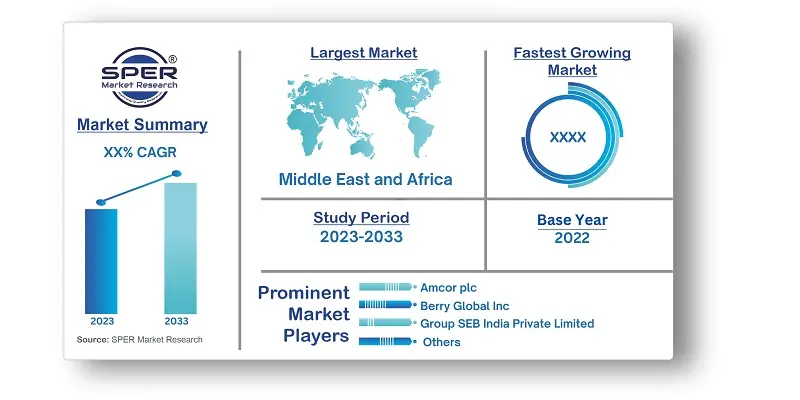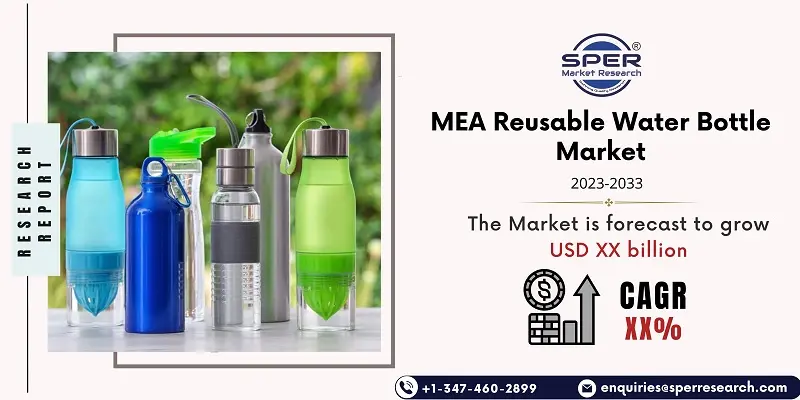
Middle East and Africa Reusable Water Bottle Market Growth, Size, Trends and Future Outlook
Middle East and Africa Reusable Water Bottle Market Size- By Material, By Type, By Distribution Channel- Regional Outlook, Competitive Strategies and Segment Forecast to 2033
| Published: Feb-2024 | Report ID: FMCG2453 | Pages: 1 - 159 | Formats*: |
| Category : Consumer & Retail | |||


| Report Metric | Details |
| Market size available for years | 2020-2033 |
| Base year considered | 2023 |
| Forecast period | 2024-2033 |
| Segments covered | By Material, By Type, By Distribution Channel |
| Regions covered | Northern Region, Western Region, Southern Region, Eastern Region, Central Region |
| Companies Covered | Amcor plc, Berry Global Inc, Group SEB India Private Limited, Helen of Troy Limited, Newell Brands, Tupperware Brands Corporation, Aptargroup Inc, Bormioli Luigi S.P.A, Others. |
- Consumers
- Retailers and Distributors
- Manufacturers and Brands
- Environmental Organizations
- Corporate Entities and Institutions
- Tourism and Hospitality Industry
- Media and Influencers
| By Material: |
|
| By Type: |
|
| By Distribution Channel: |
|
- Middle East and Africa Reusable Water Bottle Market Size (FY’2024-FY’2033)
- Overview of Middle East and Africa Reusable Water Bottle Market
- Segmentation of Europe Reusable Water Bottle Market By Material (Glass, Aluminum, Plastic, Silicone, Steel, Copper, Brass, Others)
- Segmentation of Europe Reusable Water Bottle Market By Type (Insulated, Non-insulated)
- Segmentation of Europe Reusable Water Bottle Market By Distribution Channel (Wholesale, Supermarkets/Hypermarkets, Specialty Stores, Sport Stores, Local Stores)
- Expansion Analysis of Europe Reusable Water Bottle Market
- Expansion Analysis of Middle East and Africa Reusable Water Bottle Market
- Problems and Obstacles in Middle East and Africa Reusable Water Bottle Market
- Competitive Landscape in the Middle East and Africa Reusable Water Bottle Market
- Impact of COVID-19 and Demonetization on Middle East and Africa Reusable Water Bottle Market
- Details on Current Investment in Middle East and Africa Reusable Water Bottle Market
- Competitive Analysis of Middle East and Africa Reusable Water Bottle Market
- Prominent Players in the Middle East and Africa Reusable Water Bottle Market
- SWOT Analysis of Middle East and Africa Reusable Water Bottle Market
- Middle East and Africa Reusable Water Bottle Market Future Outlook and Projections (FY’2024-FY’2033)
- Recommendations from Analyst
1.1. Scope of the report1.2. Market segment analysis
2.1. Research data source2.1.1. Secondary Data2.1.2. Primary Data2.1.3. SPER’s internal database2.1.4. Premium insight from KOL’s2.2. Market size estimation2.2.1. Top-down and Bottom-up approach2.3. Data triangulation
4.1. Driver, Restraint, Opportunity and Challenges analysis4.1.1. Drivers4.1.2. Restraints4.1.3. Opportunities4.1.4. Challenges4.2. COVID-19 Impacts of the Middle East and Africa Reusable Water Bottle Market
5.1. SWOT Analysis5.1.1. Strengths5.1.2. Weaknesses5.1.3. Opportunities5.1.4. Threats5.2. PESTEL Analysis5.2.1. Political Landscape5.2.2. Economic Landscape5.2.3. Social Landscape5.2.4. Technological Landscape5.2.5. Environmental Landscape5.2.6. Legal Landscape5.3. PORTER’s Five Forces5.3.1. Bargaining power of suppliers5.3.2. Bargaining power of buyers5.3.3. Threat of Substitute5.3.4. Threat of new entrant5.3.5. Competitive rivalry5.4. Heat Map Analysis
6.1. Middle East and Africa Reusable Water Bottle Market Manufacturing Base Distribution, Sales Area, Product Type6.2. Mergers & Acquisitions, Partnerships, Product Launch, and Collaboration in Middle East and Africa Reusable Water Bottle Market
7.1. Middle East and Africa Reusable Water Bottle Market Value Share and Forecast, By Material, 2024-20337.2. Glass7.3. Aluminum7.4. Plastic7.5. Silicone7.6. Steel7.7. Copper7.8. Brass7.9. Others
8.1. Middle East and Africa Reusable Water Bottle Market Value Share and Forecast, By Type, 2024-20338.2. Insulated8.3. Non-insulated
9.1. Middle East and Africa Reusable Water Bottle Market Value Share and Forecast, By Distribution Channel, 2024-20339.2. Online9.3. Offline9.3.1. Wholesale9.3.2. Supermarkets/Hypermarkets9.3.3. Specialty Stores9.3.4. Sport Stores9.3.5. Local Stores
10.1. Middle East and Africa Reusable Water Bottle Market Size and Market Share
11.1. Middle East and Africa Reusable Water Bottle Market Size and Market Share By Material (2020-2026)11.2. Middle East and Africa Reusable Water Bottle Market Size and Market Share By Material (2027-2033)
12.1. Middle East and Africa Reusable Water Bottle Market Size and Market Share By Type (2020-2026)12.2. Middle East and Africa Reusable Water Bottle Market Size and Market Share By Type (2027-2033)
13.1. Middle East and Africa Reusable Water Bottle Market Size and Market Share By Distribution Channel (2020-2026)13.2. Middle East and Africa Reusable Water Bottle Market Size and Market Share By Distribution Channel (2027-2033)
14.1. Middle East and Africa Reusable Water Bottle Market Size and Market Share By Region (2020-2026)14.2. Middle East and Africa Reusable Water Bottle Market Size and Market Share By Region (2027-2033)14.3. Northern Region14.4. Western Region14.5. Southern Region14.6. Eastern Region14.7. Central Region
15.1. Amcor Plc15.1.1. Company details15.1.2. Financial outlook15.1.3. Product summary15.1.4. Recent developments15.2. Berry Global Inc15.2.1. Company details15.2.2. Financial outlook15.2.3. Product summary15.2.4. Recent developments15.3. Group SEB India Private Limited15.3.1. Company details15.3.2. Financial outlook15.3.3. Product summary15.3.4. Recent developments15.4. Helen of Troy Limited15.4.1. Company details15.4.2. Financial outlook15.4.3. Product summary15.4.4. Recent developments15.5. Newell brands15.5.1. Company details15.5.2. Financial outlook15.5.3. Product summary15.5.4. Recent developments15.6. Tupperware Brands Corporation15.6.1. Company details15.6.2. Financial outlook15.6.3. Product summary15.6.4. Recent developments15.7. AptarGroup Inc15.7.1. Company details15.7.2. Financial outlook15.7.3. Product summary15.7.4. Recent developments15.8. Bormioli Luigi S.p.A15.8.1. Company details15.8.2. Financial outlook15.8.3. Product summary15.8.4. Recent developments15.9. Others
SPER Market Research’s methodology uses great emphasis on primary research to ensure that the market intelligence insights are up to date, reliable and accurate. Primary interviews are done with players involved in each phase of a supply chain to analyze the market forecasting. The secondary research method is used to help you fully understand how the future markets and the spending patterns look likes.
The report is based on in-depth qualitative and quantitative analysis of the Product Market. The quantitative analysis involves the application of various projection and sampling techniques. The qualitative analysis involves primary interviews, surveys, and vendor briefings. The data gathered as a result of these processes are validated through experts opinion. Our research methodology entails an ideal mixture of primary and secondary initiatives.



Frequently Asked Questions About This Report
PLACE AN ORDER
Year End Discount
Sample Report
Pre-Purchase Inquiry
NEED CUSTOMIZATION?
Request CustomizationCALL OR EMAIL US
100% Secure Payment






Related Reports
Our Global Clients
Our data-driven insights have influenced the strategy of 200+ reputed companies across the globe.




















